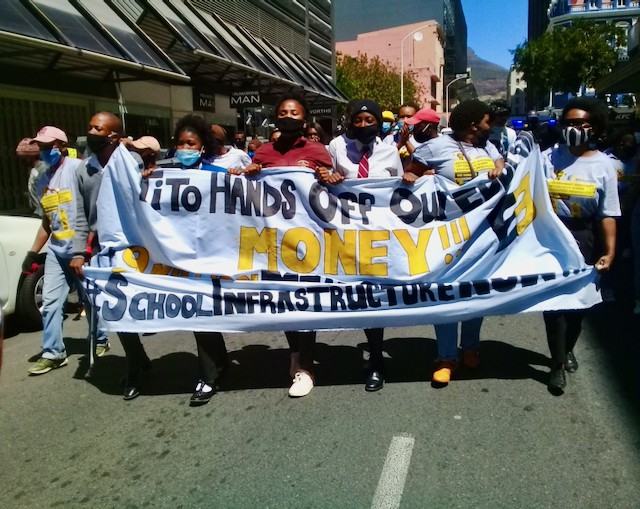NGOs warn latest budget will have bad outcomes for education
Equal Education say underfunding will cause even more overcrowded classrooms, teacher shortages and learners going without meals
On Wednesday members of Equal Education picketed outside Parliament ahead of the budget speech to demand that Minister of Finance Tito Mboweni allocate more funds to basic education. Photo: Marecia Damons
- Equal Education and SECTION27 say although the national budget increased funds for basic education, in real terms spending per learner is decreasing.
- Of major concern are cuts in funding for teachers, which will lead to shortages and even more overcrowded classrooms.
- The budget will also not allow schools to catch-up for crucial infrastructure projects suspended and cancelled due to Covid-19 last year.
SECTION27 and Equal Education (EE) say that although more funds have been allocated to education in the latest budget, funding for basic education in real terms will diminish.
The National Budget tabled by Finance Minister Tito Mboweni shows an increase in the budget for the Department of Basic Education (DBE) over the next three years. The department’s total expenditure is set to increase at an average annual rate of 7.2% from R23.4 billion in 2020/21 to R28.8 billion in 2023/24.
Despite this increase, analysis of estimates of national expenditure for basic education shows that funding will decrease per learner, in real terms, over the next three years because of inflation and increased enrolments in schools, SECTION27 said in a statement.
Recently published research also shows that government spending per learner on basic education decreased by an average of 2.3% between 2009 and 2018.
Since 2016/17, funding for education as a percentage of the total budget has decreased from almost 19% to around 15%, EE said in a statement.
The DBE’s budget will be increased by almost R4 billion from 2020, reversing previous cuts made, but the budget decreases again in the following two years if inflation is taken into account.
“[The] budget represents a continuation of concerning trends of underspending on basic education,” EE adds.
About R8 billion has been allocated to the National School Nutrition Programme (NSNP) for 2021/22, and it is set to increase at 5% annually over the next three years.
While this increase comes as good news, the latest budget still deprioritises basic education, EE said.
There will also be less money to pay teachers and other education staff over the next three years. The 2021 budget shows cuts of R254.8 million to the Funza Lushaka bursary for new teachers.
In total, cabinet has approved R1.6 billion worth of reductions to previously planned expenditure and conditional grants in the education sector over the next three years.
The Supplementary Budget, tabled on 24 June 2020, showed that R1.7 billion was cut from the school infrastructure grants alone, and a further R4.4 billion re-prioritised within the grant to cover Covid-related expenses in schools.
In the latest budget, R36.7 billion is allocated towards the Education Infrastructure Grant (EIG) over the medium term, with the sector receiving R11.6 billion for this financial year.
“The recovery of these funds, however, may not be enough to catch-up on last year’s suspended and cancelled crucial infrastructure projects at schools,” SECTION27 adds.
EE shared this sentiment. “The little bit of relief announced in the budget speech is thanks to the determined advocacy of school communities. But the victory is bittersweet because the relief is small in comparison to the cuts introduced last year.”
Since October 2020, learner members of EE, post-school youth members and parents have protested to demand that government prioritise education, that the budget cuts be reversed, and that education be declared a frontline department in the fight against Covid-19.
Members of the organisation also picketed outside Parliament on Wednesday ahead of the budget to demand that National Treasury allocate more funding to basic education in line with inflation.
“It is learners, teachers and parents/guardians who will feel the consequences of these decisions in schools, when already stretched classrooms fill up, there are too few teachers, and learners go without meals because of underfunding,” EE said.
The organisation said that it will work towards developing an alternative budget that will be informed by unemployed individuals, the working class, and people from rural communities.
Next: Shacks flooded by vandalised pipe in drought-stricken Gqeberha
Previous: Makhanda residents resort to drinking water from an old air valve chamber
© 2021 GroundUp. This article is licensed under a Creative Commons Attribution-NoDerivatives 4.0 International License.
You may republish this article, so long as you credit the authors and GroundUp, and do not change the text. Please include a link back to the original article.
We put an invisible pixel in the article so that we can count traffic to republishers. All analytics tools are solely on our servers. We do not give our logs to any third party. Logs are deleted after two weeks. We do not use any IP address identifying information except to count regional traffic. We are solely interested in counting hits, not tracking users. If you republish, please do not delete the invisible pixel.



